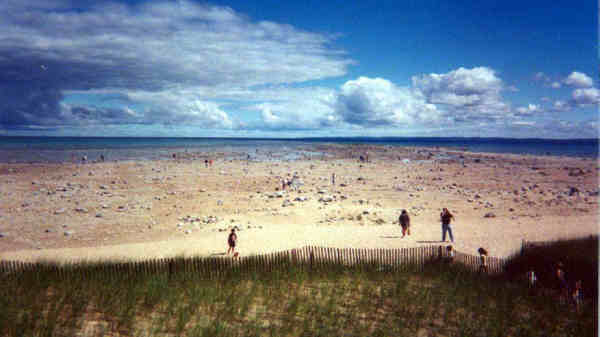
Profound effect of low water levels on the recreation aspect of the Great Lakes is shown in this University of Michigan photo. Public Input Sought for Great Lakes Water Level Study by Local Member
|
||||||||||
| Printer Friendly Story View |
David Powers, Bay City attorney and member of the International Joint Commission's Upper Great Lakes Study Board wants your opinions.
Mr. Powers is seeking public feedback on a water level regulation plan now being formulated by the study board.
Mr. Powers is a former vice president of the Save Our Shoreline (SOS) organization, headed by Ernie Krygier, a Bay County commissioner and Saginaw Bay shoreline resident.
The five-year, $15 million study is the result of a decade-long debate over water levels and riparian rights.
The levels of lakes Michigan and Huron historically have varied by as much as six feet. "Low water negatively affects shipping, marinas, boating, beaches, water quality, water supply intake pipes and other facets of the environment," said Mr. Powers. "On the other hand, high water can flood homes and businesses, cause erosion and create many other problems."
About ten years ago the levels of lakes Michigan and Huron dropped below normal, causing exposure of beaches. Vegetation and invasive phragmites plants grew on the beaches. Then, the U.S. Army Corps of Engineers asserted that owners of beachfront property could not remove the vegetation.
That situation led to the organization of SOS in 2001. The organization employs a lobbyist in Lansing, Pat McCollough from the firm of Kelley/Cawthorne.
"If only we had control over the lake levels, we might have kept the water high, and the unwanted vegetation away," wrote Mr. Powers recently.
He pointed out there is some control over water levels, primarily in the St. Marys River at Sault Ste. Marie. Among questions to be determined are whether structures to hold back water could provide better controls over the water levels.
Dredging, mining and erosion and other complicated factors including global warming also affect, or may affect, water levels.
Climate change scenarios also are being factored into the study. "Should we make water level changes to reduce the negative effects of these natural processes?" asked Mr. Powers.
Recent studies determined that the St. Clair River is not eroding and causing a loss of water in the lakes, as suggested in media reports and a study funded by Georgian Bay residents.
A University of Michigan study has shown that water levels are a profound determinant of economic and environmental conditions of coastal regions, including the Great Lakes.
Lake levels fluctuate naturally, but also are affected by human-impacted climate change. Such changes in the water's rhythmic cycle have extreme effects on their region's environment and people, some which appear irreversible.


In terms of climate change, the Great Lakes region will face degrading changes in many future scenarios. For example, one scenario predicts that "mean annual water depths will decline to below historic levels because of increased evaporation and evapotranspiration in the Great Lakes region," the U-M study showed.
Lower water levels will modify or eliminate wetlands that function to maintain shoreline integrity, reduce erosion, filter contaminants, absorb excess storm water, and provide fish and wildlife habitat, because coastal wetlands function as important staging, breeding, and wintering habitat for waterfowl and breeding and nursery areas for many fish.
In fact, lake level effects are the most important natural cause in determining the expansion and contraction of wetland classes. These fluctuations would "change the position of the water line along the shore and therefore change the shape of the zone that wetland vegetation would inhabit."
Further, although some wetlands that directly border the Great Lakes shores might be able to shift toward the low water levels, some enclosed wetlands would eventually dry up and transform into another ecosystem over time, according to the U-M study.
"In this future scenario, not only will water levels decrease, but also the region will experience increased algal growth and concentration of pollutants due to a potential reduction of wetlands and an increased average temperature, which would make lake water more susceptible to pollutants. These factors would cause "supply, odor, and taste problems in communities with shallow water intakes or pipelines designed for historical water levels", and an overall reduction in water quality.
In other words, future, relatively low water levels will impact the consumption of water from the Great Lakes region. Low water levels will also impact future energy sources and recreational/economic activity.
Specifically, low water levels will reduce the ability of existing hydroelectric stations to generate power because they will have less water from which to harness power. This inaccessible alternative energy source will limit our move toward a sustainable future. The study also predicted low water levels will also inhibit access to existing docks and facilities for commercial and recreational use, causing shipping companies to be driven out of business and the closure of recreational marinas. This decrease in accessibility will have profound economic impacts because trade and movement of goods and services between ports will become increasingly limited, the U-M study concludes.
The study group will make recommendations to the governments of the U.S. and Canada in the fall of 2011. "The IJC and its study team wants to hear from people about their thoughts on Great Lakes water levels," concluded Mr. Powers.
For more information please access www.ijc.org, the International Joint Commission website. Please send comments to Mr. Powers at dpowers@smpklaw.com.
| Printer Friendly Story View |
|
|

Dave Rogers |
|
|
|
Printer-Friendly Story View
0200 Nd: 04-14-2024 d 4 cpr 0
12/31/2020 P3v3-0200-Ad.cfm
SPONSORED LINKS
12/31/2020 drop ads P3v3-0200-Ad.cfm


